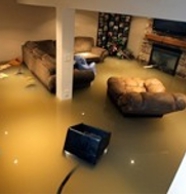What to do if your basement floods
This article was published more than 6 months ago. Some information may no longer be current

Basement flooding can occur
If your basement has flooded, there are some really important things you should know.
First and foremost, consider your family’s health and safety. Entering a wet basement could be hazardous! When in doubt, don’t enter the flooded area until you are told it is safe by a professional qualified to do so.
Before you enter your basement, consider the following:
- Electrical Shock – When your basement is wet, there is a legitimate risk of electrical shock. If you are positive that you can safely do so, turn off your home’s power at the main breaker switches. Do not enter your basement if you know or suspect water has risen above the level of electrical outlets, baseboard heaters, furnace or is near your electrical panel. Electricity can move through water or wet flooring and cause a severe electrical shock. Get additional flood safety information from the Electrical Safety Authority.
- Gas leaks and odours– If you detect the rotten egg smell of a gas leak:
- Evacuate your premises.
- If you can do so safely, open all doors and windows.
- Don’t use anything that could create static or a spark, such as electrical switches.
- Call Utilities Kingston immediately from outside your home or building at613-546-1181, extension 2151.
- Don’t use lighters or matches, and don’t smoke.
- Get more information on natural gas safety.
- Pollutants – Sewage can contain bacteria and transmit disease and the floodwater in your basement may have originated from the sanitary sewer and contain raw sewage. Wear protective items including gloves, safety glasses, a face mask and be sure to wash thoroughly after any contact with sewage or items touched by sewage.
- Chemicals – Cleaning may expose you to a wide range of contaminants, including those from the cleaning agents being used, as well as those that may have entered from flood waters. When you get to the cleaning stage, be sure to ventilate well and limit your exposure to contact and exposure as best you can.
- Structural damage – While this is not that common, a flood with certain conditions may weaken walls or even ceiling structures. If there is any concern that structural integrity has been compromised, or you simply don’t know, leave the area and call in the experts.
Learn more